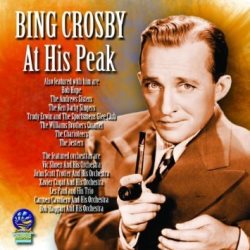| 
Support us financially by purchasing this from |
 |
 |
|
Bing Crosby - At His Peak, 1943-1945
Sunday, Monday Or Always [2:35]
If You Please [3:07]
People Will Say We’re In Love [2:57]
Oh! What a Beautiful Mornin’ [2:58]
Pistol-Packin’ Mama [3:00]
Victory Polka [2:44]
Jingle Bells [2:33]
San Fernando Valley [3:09]
I Love You [2:36]
I’ll Be Seeing You/Swinging On A Star [5:20]
Going My Way [2:51]
It Could Happen To You [2:31]
Too-Ra-Loo-Ra-Loo-Ral (That’s An Irish Lullaby) [3:14]
Don’t Fence Me In [3:05]
Ac-Cent-Tchu-Ate The Positive [2:44]
The Three Caballeros [2:43]
You Belong To My Heart [2:26]
If I Loved You [3:22]
Along The Navajo Trail [2:43]
It’s Been A Long, long Time [2:58]
The Road To Morocco [2:33]
I Can’t Begin To Tell You [2:51]
Aren’t You Glad You’re You? [2:17]
In The Land Of Beginning Again [3:26]
The Bells Of St. Mary’s [3:03]
MacNamara’s Band [2:41]
DSOY 954 [76:27]
Bing Crosby described himself as an average guy who could carry a tune; however, he was much more. With a baritone voice as smooth as honey pouring from a cup and a friendly, easy-going persona, Bing was a multi-talented star of radio and film for over fifty years. Born in Tacoma, Washington in 1903, Bing started his musical career as a drummer while attending Gonzaga University in Spokane. In 1925 he left for Los Angeles and began singing with Paul Whiteman and his jazz band. Al Jolson and the jazz scene of the 1920s had an early influence on his career. During the 1930s he began to concentrate on other material, including show tunes, country and western songs, film music, contemporary pop hits, holiday music, religious and inspirational songs, and many others. The early 1940s saw the peak of his popularity as the country struggled out of the Depression and into the War years.
Bing recorded an enormous amount of material during the 1940s using different bands and back-up singers. The 27 songs on this CD (2 songs on Track 10) were recorded between 1943 and 1946. They vary widely in style and composition. Seven songs on this CD feature Bing performing with the Andrew Sisters and Vic Shoen’s orchestra. Among these are a classic version of Cole Porter’s “Don’t Fence Me In” and a great swing version of “Jingle Bells”. Carmen Cavallero performs on the piano with his orchestra on a crackly version of “I Can’t Begin To Tell You”. The Ken Darby Singers harmonize a capella with Bing on two Jimmy Van Heusen-Johnny Burke songs (Sunday, Monday Or Always, and If You Please). There was no orchestra present at the time of those two recordings because of a ban due to a dispute over music royalties. Eleven numbers on the CD were recorded with John Scott Trotter, Bing’s long-time arranger and band leader, and his orchestra. Two of the best are “Swinging On A Star” with vocal backup by the Williams Brothers Quartet, and “The Road To Morocco” a great duet featuring Bob Hope. The listener can picture the fun these two gentlemen had recording this.
This CD is a good collection and cross-section of Bing Crosby’s work during the 1940s.
The sound is acceptable on most numbers, and the arrangements and orchestration are what one would expect to hear from popular music of this era. There is a very short set of liner-notes included.
Bruce McCollom
 |
 |
|



 All Nimbus reviews
All Nimbus reviews








